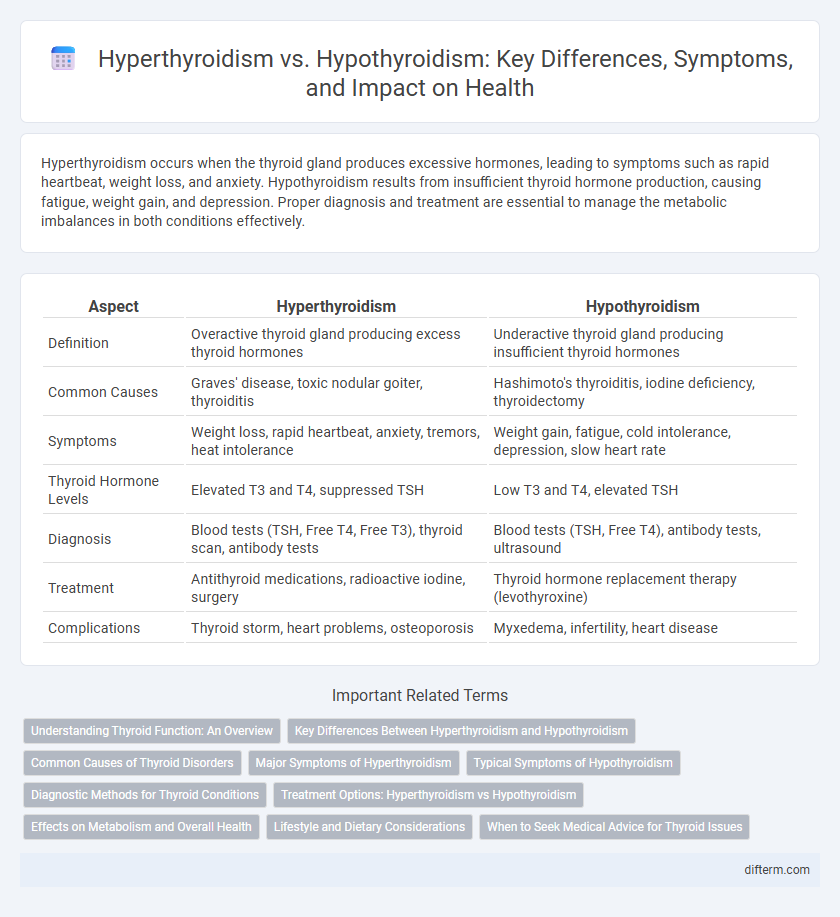Hyperthyroidism occurs when the thyroid gland produces excessive hormones, leading to symptoms such as rapid heartbeat, weight loss, and anxiety. Hypothyroidism results from insufficient thyroid hormone production, causing fatigue, weight gain, and depression. Proper diagnosis and treatment are essential to manage the metabolic imbalances in both conditions effectively.
Table of Comparison
| Aspect | Hyperthyroidism | Hypothyroidism |
|---|---|---|
| Definition | Overactive thyroid gland producing excess thyroid hormones | Underactive thyroid gland producing insufficient thyroid hormones |
| Common Causes | Graves' disease, toxic nodular goiter, thyroiditis | Hashimoto's thyroiditis, iodine deficiency, thyroidectomy |
| Symptoms | Weight loss, rapid heartbeat, anxiety, tremors, heat intolerance | Weight gain, fatigue, cold intolerance, depression, slow heart rate |
| Thyroid Hormone Levels | Elevated T3 and T4, suppressed TSH | Low T3 and T4, elevated TSH |
| Diagnosis | Blood tests (TSH, Free T4, Free T3), thyroid scan, antibody tests | Blood tests (TSH, Free T4), antibody tests, ultrasound |
| Treatment | Antithyroid medications, radioactive iodine, surgery | Thyroid hormone replacement therapy (levothyroxine) |
| Complications | Thyroid storm, heart problems, osteoporosis | Myxedema, infertility, heart disease |
Understanding Thyroid Function: An Overview
Hyperthyroidism results from excessive thyroid hormone production, accelerating metabolism and causing symptoms such as weight loss, rapid heartbeat, and nervousness. Hypothyroidism occurs when the thyroid gland produces insufficient hormones, leading to fatigue, weight gain, and cold intolerance. The thyroid gland regulates metabolism, energy balance, and hormone secretion through thyroid-stimulating hormone (TSH) and thyroxine (T4) production, making proper thyroid function essential for overall health.
Key Differences Between Hyperthyroidism and Hypothyroidism
Hyperthyroidism is characterized by an overactive thyroid gland producing excess thyroid hormones, leading to symptoms such as rapid heartbeat, weight loss, and anxiety, whereas hypothyroidism results from an underactive thyroid producing insufficient hormones, causing fatigue, weight gain, and depression. The diagnostic markers for hyperthyroidism include elevated free T4 and suppressed TSH levels, while hypothyroidism shows low free T4 and elevated TSH. Treatment differs significantly, with hyperthyroidism managed by antithyroid medications, radioactive iodine, or surgery, and hypothyroidism typically requiring lifelong thyroid hormone replacement therapy.
Common Causes of Thyroid Disorders
Graves' disease and Hashimoto's thyroiditis are autoimmune disorders commonly causing hyperthyroidism and hypothyroidism, respectively. Iodine deficiency or excess can disrupt thyroid hormone production, contributing to both conditions. Thyroid nodules, inflammation, and genetic predispositions also play significant roles in the development of thyroid dysfunction.
Major Symptoms of Hyperthyroidism
Hyperthyroidism is characterized by major symptoms such as unexplained weight loss, rapid heartbeat (tachycardia), and excessive sweating. Patients often experience nervousness, irritability, and tremors, alongside increased appetite and heat intolerance. These symptoms contrast with hypothyroidism, where fatigue, weight gain, and cold sensitivity are more prominent.
Typical Symptoms of Hypothyroidism
Hypothyroidism typically presents with symptoms such as fatigue, weight gain, cold intolerance, constipation, dry skin, and depression. Patients often experience slowed heart rate, muscle weakness, and cognitive difficulties like memory problems and slowed thinking. Early diagnosis and treatment are essential to prevent complications like goiter, infertility, and myxedema.
Diagnostic Methods for Thyroid Conditions
Diagnostic methods for thyroid conditions include blood tests measuring thyroid hormone levels such as TSH, T3, and T4 to distinguish hyperthyroidism from hypothyroidism. Imaging techniques like thyroid ultrasound and radioactive iodine uptake scans provide detailed insights into gland structure and function. Fine needle aspiration biopsy is used for further evaluation when nodules or suspicious areas are detected.
Treatment Options: Hyperthyroidism vs Hypothyroidism
Hyperthyroidism treatment options include antithyroid medications such as methimazole, radioactive iodine therapy, and thyroidectomy, aiming to reduce excessive thyroid hormone production. Hypothyroidism is primarily managed with daily levothyroxine replacement therapy to restore normal hormone levels, adjusting dosage based on TSH and free T4 measurements. Both conditions require regular monitoring to optimize treatment efficacy and prevent complications.
Effects on Metabolism and Overall Health
Hyperthyroidism accelerates metabolism, leading to symptoms such as weight loss, increased heart rate, and heat intolerance, which can cause muscle weakness and osteoporosis if untreated. Hypothyroidism slows metabolic processes, resulting in weight gain, fatigue, cold intolerance, and depression, with potential long-term effects including heart disease and infertility. Both conditions significantly impact overall health by disrupting hormonal balance and metabolic regulation.
Lifestyle and Dietary Considerations
Managing hyperthyroidism requires a diet rich in calcium and vitamin D to counteract bone loss, while avoiding excessive iodine intake that may exacerbate symptoms. In hypothyroidism, a diet high in fiber aids digestion, and selenium-rich foods support thyroid hormone production, with caution to limit goitrogenic foods like soy and cruciferous vegetables. Regular monitoring and tailored lifestyle changes, including stress management and exercise, optimize thyroid function and overall well-being.
When to Seek Medical Advice for Thyroid Issues
Seek medical advice for thyroid issues when experiencing unexplained weight changes, persistent fatigue, irregular heart rate, or changes in mood and energy levels. Early diagnosis and treatment of hyperthyroidism or hypothyroidism can prevent complications such as heart problems, osteoporosis, and infertility. Regular thyroid function tests are essential for individuals with a family history of thyroid disease or symptoms suggesting hormonal imbalances.
Hyperthyroidism vs Hypothyroidism Infographic

 difterm.com
difterm.com